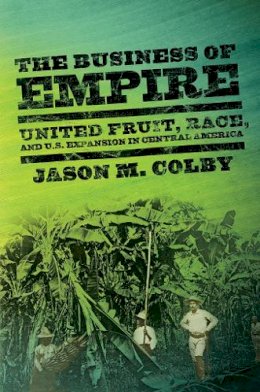
The Business of Empire: United Fruit, Race, and U.S. Expansion in Central America
Jason M. Colby
The link between private corporations and U.S. world power has a much longer history than most people realize. Transnational firms such as the United Fruit Company represent an earlier stage of the economic and cultural globalization now taking place throughout the world. Drawing on a wide range of archival sources in the United States, Great Britain, Costa Rica, and Guatemala, Colby combines "top-down" and "bottom-up" approaches to provide new insight into the role of transnational capital, labor migration, and racial nationalism in shaping U.S. expansion into Central America and the greater Caribbean. The Business of Empire places corporate power and local context at the heart of U.S. imperial history.
In the early twentieth century, U.S. influence in Central America came primarily in the form of private enterprise, above all United Fruit. Founded amid the U.S. leap into overseas empire, the company initially depended upon British West Indian laborers. When its black workforce resisted white American authority, the firm adopted a strategy of labor division by recruiting Hispanic migrants. This labor system drew the company into increased conflict with its host nations, as Central American nationalists denounced not only U.S. military interventions in the region but also American employment of black immigrants. By the 1930s, just as Washington renounced military intervention in Latin America, United Fruit pursued its own Good Neighbor Policy, which brought a reduction in its corporate colonial power and a ban on the hiring of black immigrants. The end of the company's system of labor division in turn pointed the way to the transformation of United Fruit as well as the broader U.S. empire.
Product Details
About Jason M. Colby
Reviews for The Business of Empire: United Fruit, Race, and U.S. Expansion in Central America
Choice
Colby writes both a comparative and a transnational history. He presents a deeply researched, richly textured comparative study of the UFC in Costa Rica and Guatemala. The Business of Empire makes a worthwhile contribution to the social and cultural history of the UFC, the history of British Caribbean migrants in Central America, Central American labor history, and the inception of particular racialized forms of nationalism in Central America that, Colby convincingly argues, were logical reactions to U.S. 'corporate colonialism.'.
American Historical Review
Colby's tightly focused research on race adds a new layer of understanding to the subject of U.S. domination in Central America. Concentrating on the varied environments of the Panama Canal Zone, self-defined 'white' Costa Rica, and Guatemala, with its large Mayan Indian population. Colby observes the different tactics and vocabulary employed by governments and company officials. Many actions that are seen as indicative of United States foreign policy, he argues, were, in fact, creations of the United Fruit Company.
Times Literary Supplement
In the United States this book will be seen as an important contribution to the 'America in the World' approach; in Central America it will be read as an influential revision of the impact of the 'Octopus' on internal processes. Without a hint of dependency theory (it used to be mandatory to refer to dependency when writing about UFCO), Colby's perspective sheds new light on the fruit company's impact on the economies, societies, politics and foreign relations of Central American countries.
Héctor Lindo-Fuentes
Journal of Latin American Studies
Jason M. Colby has researched and analyzed his topic—the business of empire—well. He exposes the intertwining of imperialism, expansion, racism, and corporate power. The Business of Empire is an insightful story about the interaction of U.S. overseas business and the U.S. and Central American governments. It will prove useful to scholars of U.S. imperialism, international business history, and U.S.–Central American relations for generations.
Journal of American History
